DO-IT News October 2021

Volume 29, Number 3
Below are the articles from the DO-IT News October 2021 newsletter. These articles can also be seen all on one page at the Full Newsletter option.
Three New DO-IT Collaborations Serve to Increase Accessibility and Inclusion in Computing Fields
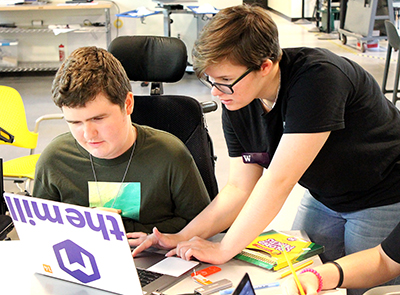
DO-IT is excited to announce three new computing-related grants from the National Science Foundation. These grants build upon our history of making computing fields more welcoming and accessible to people with disabilities.
Two grants are continuations of current projects. AccessComputing is one of DO-IT’s longest running projects, starting in 2003. AccessComputing helps students with disabilities successfully pursue undergraduate and graduate degrees and careers in computing fields, and works to increase the capacity of postsecondary institutions and other organizations to fully include students with disabilities in computing courses and programs. AccessComputing promotes a growth in computing fields that benefits the nation by helping to improve the ability of its technology workforce to respond to national needs that depend, more and more, on computing technology. AccessComputing partners with over 75 academic institutions, computing organizations, and tech companies to achieve its common goals.
AccessComputing will be led by PI Richard Ladner; co-PIs Sheryl Burgstahler, Stacy Branham (UC Irvine), Raja Kushalnagar (Gallaudet), Elaine Short (Tufts University); senior personnel Amy Ko (UW Information School) and Associate Director Brianna Blaser. DO-IT is excited to welcome new co-PIs to the project.
Building on previous work, the grant will include new activities such as
- expanding the leadership team beyond the University of Washington to include emerging leaders from three new institutions;
- expanding the academic partners to include more community and technical colleges;
- expanding the AccessComputing students and the services available to them;
- collaborating with other BPC (Broadening Participation in Computing) Alliances to coordinate and synergize BPC efforts related to gender, race, ethnicity, and disability;
- expanding the industry partners and interactions with them;
- expanding the organizational partners to include more subdisciplines in computing fields; and
- developing a comprehensive and adaptable e-book for teaching accessibility and disability topics in computing courses.
AccessCSforAll is a continuing collaboration between the University of Washington and the University of Nevada Las Vegas with the goal of including more K-12 students with disabilities in computing classes. The project aims to decrease barriers such as inaccessible tools and curriculum while improving access to quality computer science education for students with disabilities. Building on our previous work with developing an accessible version of AP Computer Science Principles (CSP) and leading the professional development for teachers who specialize in students with disabilities, AccessCSforAll will develop new tools and curricula that can be adopted by a variety of development and curriculum providers. In addition, AccessCSforAll will extend its researcher practitioner partnership (RPP) to include CS curriculum providers, in-service and pre-service providers, and organizations that support K-12 CS teachers. This partnership will lead to the adoption of more accessible tools and curricula in the teaching of computer science nationally. AccessCSforAll is led by PIs Richard Ladner and Andreas Stefik and co-PI Sheryl Burgstahler.
This project includes partnerships with developers of accessible tools and curricula for K-12 students and will work as a national resource for CS teachers to help them better include students with disabilities in their classes. The primary goal of the project is to scale up past efforts to make computer science classes equitable and welcoming to all students in the United States. It will create and deploy an age appropriate accessible blocks-based programming environment for the web called Quorum Blocks. Quorum Blocks will allow students to engage in accessible coding in blocks mode or text mode. Curriculum providers and teachers can embed it into any curriculum of their own design. This expansion will work towards reaching the approximately 16% of high school students who have a disability. AccessCSforAll represents one of the first comprehensive steps to provide that scaling up to include these students in computer science.
Our third new computing-related project is brand new—Creating and Testing Data Science Learning Tools for Secondary Students with Disabilities. PIs include Andreas Stefik (University of Nevada Las Vegas), Nicholas Giudice (University of Maine), Jenna Gorlewicz (University of St Louis), and DO-IT’s Brianna Blaser. The main goal of this collaborative project is to create and evaluate a universally accessible data science infrastructure for high-school-aged learners, with a focus on students with disabilities. Data science is critical in the development of industry-relevant computational thinking skills. Computing initiatives, including data science, are rapidly growing because of the compelling career pathways that data science skills provide. A careful investigation into already-at-scale data science initiatives shows that such tools and curriculum are largely not accessible to individuals with disabilities, nor do they have a strong foundation of human factors evidence supporting their designs. These issues are crucial and must be resolved for workforce equity and a diverse science, technology, engineering, and mathematics (STEM) pipeline.
This project will bring together investigators in computer science, mechanical engineering, education, social science, and cognitive neuroscience to rethink the tools that support the teaching and learning of data science at the high school level. The overarching goal will be to create and evaluate data science tools and curriculum that are not just in legal compliance for accessibility, but that carefully take into account the needs of learners, including those with disabilities. By creating, deploying, and rigorously evaluating the first data science tool and curriculum that is accessible to all, the project intends to help create equitable pathways for all students to enter the field of data science.
2021 Trailblazer Award Winners
The DO‑IT Trailblazer award highlights DO‑IT community members who forge new pathways that will benefit others. Through their work and accomplishments, they have changed the way the world views people with disabilities and have increased the potential of people with disabilities to succeed in college, careers, and community life. Congratulations to this year’s four honorees!
Read about previous DO-IT Trailblazers online.
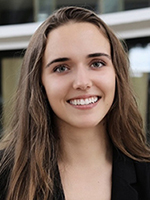
Emily Boeschoten, 2015 Scholar and Ambassador, participated in the National Science Foundation’s Young Scholars Program over summer 2016 at the UW Center for Neurotechnology (CNT), where she began working with Center co-director Chet Moritz. Over summers 2018 and 2019, she did undergraduate research with Chet at the Restorative Technologies Laboratory. Chet shared that over these past five years, Emily has enthusiastically shared her rich personal experiences with our doctor of physical therapy students for the past 5 years. Her important messaging, delivered with a robust sense of humor about her challenging diagnosis, has inspired future health care providers to put the patient at the center of all clinical decision-making. She has also engaged deeply in research projects, empathizing with participants and broadening her colleagues understanding of how disability can inspire leadership in powerful ways.
To expand her horizons, Emily joined the University of Oregon Business School’s management consulting group in January 2019. In June 2020, she graduated from the University of Oregon with a bachelor of science in sociology with departmental honors, Phi Beta Kappa. She was offered the NSF Graduate Research Fellowship in Sociology for 2021, but declined due to pandemic-related reasons. She participates in the Disability:IN NextGen program and has recently returned to working in the UW Center for Neurotechnology lab.
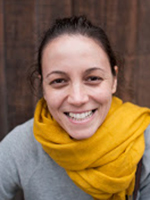
Maya Cakmak, a DO-IT collaborator on our work in AccessEngineering, has worked to introduce students with disabilities to robotics. Maya is an associate professor in the Paul G. Allen School of Computer Science and Engineering at the UW where she directs the Human-Centered Robotics Lab. Her research interests are in human-robot interaction, end-user programming, and assistive robotics. She aims to develop robots that can be programmed and controlled by a diverse group of users with unique needs and preferences to do useful tasks. Over multiple summers, Maya has hosted week-long workshops related to robotics for DO-IT’s Summer Study program. She has also hosted AccessComputing students learning about research in computer science.
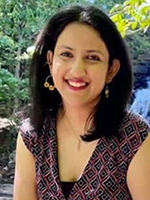
Meenakshi Das is a recent graduate of Auburn University who studied computer science. She has been an active member of our AccessComputing program for the last five years, coordinating panels featuring students with disabilities at conferences, participating in conversations on our mailing list, and attending a capacity building institute. In 2017, Meenakshi, along with AccessComputing partner, Dr. Sarah Lee, were awarded a minigrant to facilitate a one-day workshop for students who are visually impaired. Meenakshi has engaged in many activities that benefit the disability community, such as running a Facebook support group for working professionals with disabilities, Working With Disabilities. This group provides a space to discuss ableism, accessibility, and share useful resources with each other.
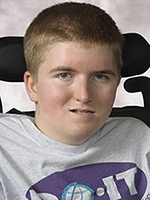
Grady Thompson, 2015 DO-IT Scholar and Ambassador and former accessibility student assistant for Accessible Technology Services and DO-IT, recently graduated from the University of Washington (UW) with a degree in informatics and a minor in disabilities studies. After graduation, Grady joined DocuSign where he works on digital accessibility in the engineering department. While Grady was at the UW, he interned at Intel in their accessibility office, where he contributed updates to their internal website and helped develop new processes to make Intel’s workplace and products more accessible. As a universal design consultant for the Associated Students of the University of Washington (ASUW) Student Disability Commission, he worked on projects to improve the accessibility of UW’s student government, programs, and activities, including serving on a task force that ultimately led to the creation of a new office of inclusive design within ASUW. Grady has been a student staff member supporting Summer Study for the past two years. Grady also participated in the Disability:IN NextGen Leaders Program where he met his mentor at Intel who mentored him through his internship at Intel.
DO-IT Included in Two New NSF INCLUDES Grants
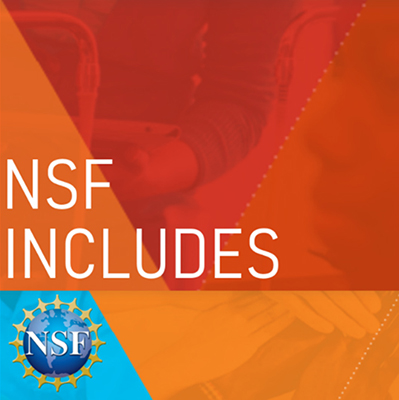
The University of Washington DO-IT Center is a partner organization in two different INCLUDES (Inclusion across the Nation of Communities of Learners of Underrepresented Discoverers in Engineering and Science) Alliances recently funded by the National Science Foundation.
NSF INCLUDES TAPDINTO-STEM Alliance
The first is for $800,000 to lead West Coast activities of the NSF INCLUDES Alliance of Students with Disabilities for Inclusion, Networking, and Transition Opportunities in STEM, also known as the NSF INCLUDES TAPDINTO-STEM Alliance. The nationwide project will employ a collective impact approach with dozens of partnering organizations to increase the number of students with disabilities who complete associate, baccalaureate, and graduate STEM degrees and enter the STEM workforce.
Auburn University is leading this NSF INCLUDES Alliance’s primary partnerships with five institutions of higher education (IHE) that will direct regional hubs of collaborating IHEs to address this national need. The hubs will be championed by Auburn University, Northern Arizona University, The Ohio State University, the University of Hawaii-Manoa, the University of Missouri-Kansas City, and the University of Washington.
On the University of Washington team, DO-IT Program Manager Scott Bellman will serve as the UW project director and lead activities of the West Coast Hub. The UW's Eric Chudler will serve as a lead mentor and STEM educator. The West Coast Hub, which currently includes San Diego State University and the University of Alaska Anchorage, will provide support to students with disabilities and provide training and engagement with postsecondary educators and administrators. A research component will compare information from the NSF INCLUDES TAPDINTO-STEM Alliance students with data from an ongoing DO-IT longitudinal study to examine which interventions students regard as most valuable, investigate patterns linking student demographics or interests with the interventions used, and study suggestions for improving or expanding interventions.
Learn more about this project through the Auburn news announcement.
The Alliance for Interdisciplinary Innovation in Computing Education (AIICE)
DO-IT is also a partner in the Alliance for Interdisciplinary Innovation in Computing Education (AIICE), which is led by Nicki Washington and Shaundra Daily at Duke University. AIICE was awarded $10 million to develop tools and strategies in computing education that increase the entry, retention and course or degree completion rates of high school and undergraduate students from historically underrepresented groups. As a partner organization, DO-IT will work closely with members of the Alliance to ensure that activities are accessible and welcoming to people with disabilities. DO-IT staff member Brianna Blaser, who serves as associate director of AccessComputing, will lead DO-IT’s engagement.
AIICE will focus on creating more equitable computing spaces, which will encourage technology creators from a diverse range of identities to occupy development and leadership positions in order to avoid creating potentially harmful technologies such as facial recognition and predictive policing. However, this possibility will take an investment from the entire community--bringing together a large group of computer science educators at the high school and post-secondary level.
AIICE will create systemic change by blending aspects of social science with computer science to increase student and educator knowledge of identity and related topics; support computer science educators and leaders nationwide in fostering academic cultures that are more inclusive of non-dominant identities; and increase policy-driven changes to computer science education in K-12 schools and higher education that infuse identity-inclusive strategies.
Learn more about AIICE through the Duke news announcement.
Summer Study: What Do Phase I Scholars Do?
This year, DO‑IT Phase I Scholars participated in a three-week Summer Study session. They learned about college life; explored online resources; interacted with peers, staff, and mentors; and had fun. The DO‑IT Scholars program started in 1993 as an experimental project for teens with disabilities nationwide. While it is usually held on campus at the University of Washington, this year it was held online. It is currently open to Washington State teens and is supported by the State of Washington. The DO-IT Scholars program is supported by all DO-IT staff and led by Tami Tidwell, Kayla Brown, and Andrea Mano.
NOTE: We had so many amazing articles this year from Scholars, we are sharing more in our next issue!
Empowerment Through Assistive Technologies
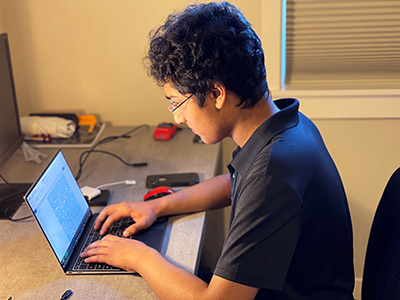
“For most of us, technology makes things easier. For a person with a disability, it makes things possible.” by Judy Heumann, American Disability Rights Activist and Former US Assistant Secretary
While in high school, I often wondered about the challenges I would face in college; some tasks that come naturally for others, are sometimes harder for me. For example, I can struggle with taking notes while trying to follow along. I sometimes have trouble focusing on the teacher in class while also capturing notes, and this ends up affecting my understanding of the concepts being discussed.
DO-IT introduced me to assistive technologies such as Sonocent Audio Notetaker, Inspiration graphic organizer software, and Moleskine Smart Pen, which opened me up to a world of opportunities. Sonocent is a note-taking software that allows students to understand lectures and discussions more effectively. I have used the Sonocent audio notetaker during my lectures at DO-IT and was able to focus on the important parts of the lecture while the software captured audio notes for me to review later. Inspiration helped me to be more organized and accomplish a specific task by using concept maps, mind maps, diagrams, graphic organizers, outlines, and presentations. I learned that the Moleskine Smart Pen allows me to amplify my handwritten ideas using digital technology. It helps me transfer words, graphics, ideas, and events directly to my smartphone, tablet or PC. These three assistive technologies can really help me overcome some of the key challenges that inhibit my learning.
My experience at DO-IT also made me curious about other assistive technology gadgets and software that are available. Some research on the internet made me aware of a number of excellent gadgets and tools and the ones that stood out for me are the AV1 Robot, MathTalk, Liftware, and Talkitt. The AV1 Robot acts as the student’s voice and ears if they miss school due to a long absence, and makes it possible to receive education being taught in class from home through an app on a tablet or smartphone. The AV1 also enables the child to stay socially connected with friends, and also take part in different school activities on their own time. Since I like mathematics, I found MathTalk to be an interesting piece of assistive technology. MathTalk allows the user to voice all types of math from algebra, pre-algebra, calculus, trigonometry, graphs, and statistics. The software enables physically challenged professionals, teachers, and students to voice out math without having to use a keyboard. The user can print out math work, and learn to speak distinctly and clearly. Another piece of technology that intrigued me was Liftware. Liftware helps people with motor disabilities to stabilize and reduce spilling of contents while eating. Liftware acts as a self-stabilizing handle that’s attached to the eating utensil—like a spoon or fork—thereby reducing shaking. One final piece of great assistive technology I learned about was Talkitt. The Talkitt app helps people with language and speech disorders to communicate more effectively with others. It translates difficult-to-understand pronunciation and spoken words into understandable speech, making it caregivers and others around the user easier to understand.
I’m really passionate about technology and would love to have a positive impact on the world. As part of my experience at DO-IT, it was really inspiring to see how technology—specifically assistive technology—can empower us and change lives.
Week One Hobby and Movie Nights
On Tuesday evening, we had a hobby night where a handful of Scholars and staff got together on Zoom to show off our hobbies. Of the people who showed up, most had a hobby related to art, one Scholar sang and I presented some of my models made out of thin sheets of steel. It was interesting to see what people presented.
On Wednesday evening, we had movie night. The selected movie was Star Wars: A New Hope, which was a movie that I suggested. We watched the movie over Zoom, and I was surprised that the quality was better than I expected. I’m used to using my iPad for Zoom, which does not seem to stream video very well—I would not recommend using one to watch even short videos over Zoom. This was the first time in over a decade that I got to watch A New Hope, and I highly enjoyed it.
Why Autistic People are Drawn to Anime
Autism, or autism spectrum disorder (ASD), refers to a broad range of conditions characterized by challenges with social skills, repetitive behaviors, speech, and nonverbal communication. According to the Centers for Disease Control, Autism affects 1 in 54 children in the United States today. There is no one type of autism—it’s not called a spectrum for nothing! Some people with ASD may require significant support in their daily lives, while others may need less support, and in some cases, live entirely independently. In spite of stereotypes, some people with autism may be very social, but have difficulty understanding other people’s viewpoints or interpreting their behavior. Many people with autism also have difficulty dealing with certain sensations (loud noise, bad smell, strong taste, rough textures). People with autism also often have “special interests” that they focus on and want to share with other people.
I believe most autistic people like anime because it often exaggerates the characters, making their intentions very clear and not leaving anything out. When you have a hard time interpreting what people are doing and why, anime doesn’t leave you guessing! Anime also has a wide range of interesting characters, many of whom share traits that many autistic people recognize in themselves. It is exciting when you see your disability (or features of it) represented in a positive and interesting way.
Some examples of anime characters with autism include Sai from Naruto Shippuden, Nagisa Furukawa from Clannad, Shiina Mashiro from Sakurasou No Pet Na Kanjo, L from Death Note, Mei Hatsume from My Hero Academia, and Felli Loss from Chrome Shelled Regios. Many of these characters exist in their own world, are obsessed with their specific interests, or need tips and tricks to communicate and make friends with neurotypical people.
Sai was the first autistic anime character I ever really connected with, because he is so open about what he does or does not understand in social situations. I related so much to him! Anime provides this avenue for people with autism to more easily connect with a variety of characters, and for differences to be seen as normal. All people with autism deserve acceptance because they are all beautiful, whether they are fictional or real.
Hard Worker and Learner
My name is Deliah, and I attended the DO‑IT Summer Study Program. I loved studying and learning new ideas from this program; however, I also had to work this summer.
I work at Subway; it’s near the highway, so it’s usually busy. This can leave me constantly drained of energy. When Tami notified me I was in the program and that it was going to be online, I quickly decided I would figure out a way to work and still participate and be active in DO-IT classes.
I told my manager my schedule for the Summer Study and then emailed Tami with which days and times I needed to work. At first I thought it would be difficult to sort out my hours, but it made me very gleeful that they accepted my given times, which let me plan ahead! I also made sure to remind the DO-IT staff before I left for work.
Going to work and participating in Summer Study ended up being easier to balance than I imagined thanks to the accommodations given to me from both my boss and DO-IT!
DO-IT Opportunities and Experiences
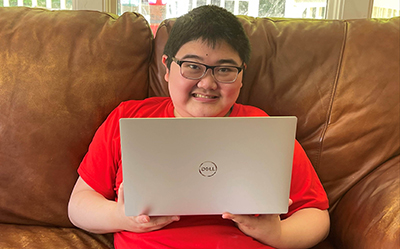
During DO-IT Summer Study classes, I have learned many skills including web design, communication, and college life preparation. For example, what I learned about college life preparation is that you have to learn skills on your own in order to find a successful life in college, and that you must advocate for yourself.
The most exciting thing I experienced in the DO-IT program was meeting people who have similar interests. The most challenging part of the DO-IT program to me was developing codes for website design. Specifically, I added details to the About HTML page, Evening HTML page, Newsletter HTML page, Photo Gallery HTML page, Meet Our Scholars HTML page, Contact Us HTML page, and created a section heading. I also developed my own personal web page using Visual Studio Code. I am passionate about coding that will benefit people’s access and make life easier for them. Regardless of the background and physical conditions of the individual, coding can make everyone’s dream come true.
I am so thankful for the opportunities and experience I have received from the DO-IT Scholars program. They will enable me to succeed in college academically and socially.
My Life with Multiple Disabilities
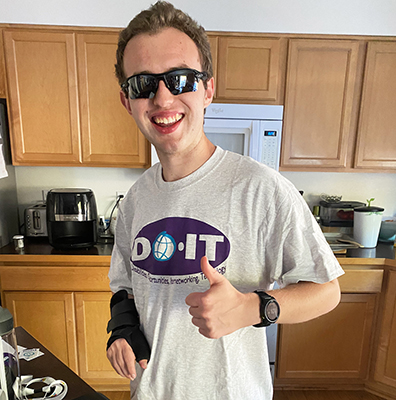
Low Vision
When I was around 11 years old, we discovered that I had significant vision loss. I started using accessibility products for people with low vision, but originally refused to use a mobility cane because I didn’t think I needed one—I was used to how I saw and traversed the world. I didn’t use one until I was 15 and I received an assessment that recommended that I use one. At first I was unsure, but I decided to be optimistic and at least try out the idea of using a cane. So, I gave it a try. The first place I went to try out the cane was the mall because I thought that would be busy and an excellent chance to see how people reacted to the cane and how I felt about it in the large crowds. I couldn’t believe the benefits I experienced from using it. I was less stressed, and was even able to enjoy myself. So, now I use a cane whenever I am out in public.
Cerebral Palsy
I have cerebral palsy as a result of a stroke in the womb. I would say that this disability has impacted my life the most, but it is also the one that I forget about more often because I’m so used to adapting to anything in my life. Some things I have adapted to doing “differently” than most people are putting on a shirt, tying my shoes, and washing my hands. I also wear orthotics that help my mobility so I can move without pain. DO-IT Summer Study has helped me a lot with my disabilities from the technology and the support they have given me so far.
Epilepsy
I also have partial company seizures, which means I have non-convulsive seizures. So if you see me having a seizure, I would just look like I am staring off into space. I have small seizures almost every day but about once a month I have a more intense seizure where my vision goes out and I am unaware of anything for about 2 to 3 minutes. Someone usually leads me to the couch or my bed and I lie down for about an hour. After that I am usually fully recovered and ready to go on with the day.
In conclusion, the disabilities I have are quite significant, but I have learned to adapt to them since they are the only life I know!
Getting Snacks in the Mail!
Have you ever wanted to get a box of snacks sent to you for free? It’s fun, exciting, and you get to eat! Snack boxes are an exciting part of Summer Study because you get to pick what you want, get a package in the mail, and then eat all the snacks!
The first reason why snack boxes are fun is being able to pick out what you want. Once you get onto the website, there are different snack topics like beverages, pantry items, crunchy snacks, and more. When clicking on the item you want, there should be an add to cart button. When you’re done finding all the snacks you want, there is a checkout button—we got to pay with credit from the Scholars program. It was exciting to get the confirmation email from UPS and get a tracking number. You then can look forward to your snack box!
The second reason why snack boxes are exciting is getting the package in the mail. After you pick out your snacks, the UPS company will label your package and send it off. After a few days, it arrives in the mail—then you are free to open your box of snacks.
The last reason why snack boxes are great is the eating. After opening the box of snacks you can eat to your heart’s content. How’s your box of snacks? You’re probably thinking it was fun, exciting, and—the best part—delicious.
The DO-IT Talent Show
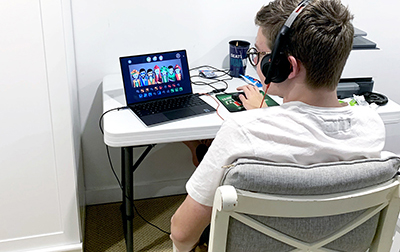
The DO-IT Talent Show was a great event. There were many participants showing many talents, not to mention all the fun the audience got to have watching them. There was music, poetry, and even a TikTok dance. I got to share my custom music, which I made using a music-making application called Incredibox. My music is an ode to various genres coming out of Brazilian and Indian culture. I also had enough time at the end of the Talent Show to showcase a second song. I also really enjoyed hearing the other talents, including piano playing and a custom poem. I highly recommend that others attend the Talent Show to both see other participants’ talents and to show off your own.
How a Thousand Butterflies Ventured Out of My Stomach During Summer Study
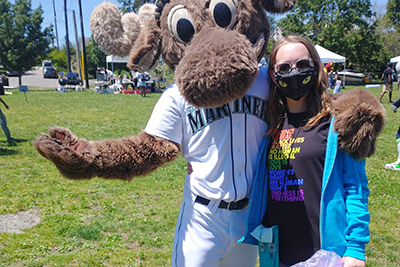
Did you know that anxiety disorders negatively affect thirty percent of adults in the United States, while they only affect eight percent of children and teenagers in the same country? I am a teenager with general anxiety disorder. Consequently, I generally have a difficult time getting used to new environments. However, my teachers and family members highly recommended that I participate in the DO-IT Scholars program so that I could find it easier to prepare for college. I have always wanted to go to college, but I have also always been extremely nervous to transition into adulthood. I feared that I would never become ready for all of the responsibilities that I need to take on in order to become successful as an adult. Nevertheless, when I got accepted into the DO-IT program, all of the staff supported me so much that I currently know much more about college than I did even a few weeks ago! This decreased my anxiety about needing to stay overnight away from my parents for so long. The DO-IT program has made fantastic progress in defeating my excessive anxiety about going to college.
I really enjoyed watching the movie called Fixed and discussing it with my peers. Here I learned that my disability should not stop me from being successful in college and beyond. When DO-IT staff member Kayla Brown showed the whole class Fixed, I immediately caught the premise of the movie—your disability makes you who you are and doesn’t need to be fixed! This premise sank into my soul so much that it played a major role in decreasing my anxiety about college.
Kayla and the movie both presented excellent explanations about the differences between the medical and social model of disability. Before I started the DO-IT program, I thought that only one model of disability existed. However, Kayla and Fixed both described how the medical model presented that “disability is a problem that exists within the person and the goal is to fix the person.” The medical model of disability was commonly used before the Americans with Disabilities Act of 1990 prohibited discrimination based on disability. Nevertheless, the presenter and movie both stated that the medical model of disability is largely obsolete. Accordingly, the medical model even showcases ableism, presenting people with disabilities as purely inspiration for people without disabilities. However, many Americans currently realize that the medical model of disability is incorrect.
Now, many people use the social model of disability. According to Kayla Brown, “the social model recognizes that disability and impairment are two different things. Disability is a social construct created by barriers within institutions, attitudes, stereotypes, and inequality.” The social model does not present any phenomena about needing to fix disabilities. Instead, the social model presents disabilities as deriving from and playing a major role in society. Consequently, learning about the social model helped me become less anxious about the life ahead of me because it made me realize that Americans are really improving when it comes to respecting people with disabilities. Therefore, in a lot of workplaces across the United States, the chance that I will be hired for a job will be similar to the chances that people without disabilities will get hired for that same job. This highly increases my confidences about my successes later in life.
Since this year’s DO-IT Summer Study was fully online, I knew that I could not spend my whole three weeks of summer study performing DO-IT related tasks. Therefore, I could finish all of my DO-IT related activities on time and still embark on local ventures that were not at all associated with DO-IT. I researched events that occurred within King County that I could attend with my mom. I found a super fun event where I met a whole bunch of Seattle sports-related characters and took selfies with them. This event occurred in South Seattle. After I met all of the characters, I made some pastel art for a nearby art club and got to watch various dance performances. This was one of the best ventures that I had gone on since before the pandemic! This experience showed me that I can still behave like a kid during my days off work as an adult. Since very few kid-friendly events occurred during the pandemic, I forgot that I could still embark on these kinds of kid-friendly ventures as an adult and not be judged for attending those events. I also got to spend an afternoon riding water slides at Wild Waves!
During the last few weeks, I have learned that even though I am super busy performing work-related tasks so frequently, I can still make time to embark on super fun adventures! Moreover, I have learned that DO-IT can help me succeed in college and beyond!
DO-IT Director Wins OLC Award
The Online Learning Consortium (OLC) recently announced the 2021 OLC Accelerate award winners, celebrating peer-reviewed excellence in digital teaching and learning practice and scholarship, equity and inclusion, and open education. DO-IT founder and director Sheryl Burgstahler received the Leadership in Equity and Inclusion in Online Learning Award for her contributions to the field of digital learning exemplifying the principles of equity, inclusion, and accessibility. One of her nominators noted that “Sheryl was one of the first educators to think about universal design in online education, and her work over the years in creating ideas and resources to benefit students with disabilities and others have had an immeasurable impact.”
“The OLC Awards program is an opportunity to showcase leadership and innovation in the field of online, blended, and digital learning,” said Dr. Jennifer Mathes, Chief Executive Officer of the Online Learning Consortium. “We are thrilled to amplify the inspiring work of our winners... The awards program allows us not only to celebrate the incredible work that has been done by our community in the past year, but to look forward to what is possible in the year to come.” OLC celebrated award winners in September with a virtual awards gala.
DO-IT Director Shares About Creating Inclusive Learning Opportunities
DO-IT Director Sheryl Burgstahler joins the Trending in Education podcast to talk about her work in access, universal design, and universal design for learning (UDL). Sheryl shared how she got involved with accessibility in the early days of home computing and how that has evolved into her role at the University of Washington today. Listen online.
About DO-IT
DO-IT (Disabilities, Opportunities, Internetworking, and Technology) serves to increase the successful participation of individuals with disabilities in challenging academic programs and careers, such as those in science, engineering, mathematics, and technology. Primary funding for DO-IT is provided by the National Science Foundation, the State of Washington, and the U.S. Department of Education.
For further information, to be placed on the DO-IT mailing list, request this newsletter or other materials in an alternate format, or make comments or suggestions about DO-IT publications or web pages, contact us at
DO-IT
University of Washington
Box 354842
Seattle, WA 98195-4842
doit@uw.edu
www.uw.edu/doit/
206-685-DOIT (3648) (voice/TTY)
888-972-DOIT (3648) (toll free voice/TTY)
509-328-9331 (voice/TTY) Spokane
206-221-4171 (fax)
Founder and Director: Sheryl Burgstahler, Ph.D.
Program Manager: Scott Bellman